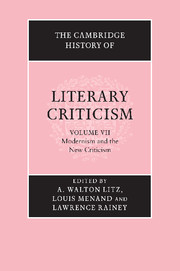2 - Ezra Pound
from THE MODERNISTS
Published online by Cambridge University Press: 28 March 2008
Summary
More than a quarter-century after his death, Ezra Pound remains the most controversial poet of the twentieth century. For some, his poetry lacks intellectual depth and emotional resonance. Its notoriety is the result of unconventional posing rather than a genuine contribution to the poetic tradition, and the many poets who have been beguiled by his example, chiefly Americans, have been misled into a sterile bypath. For others, his poetry retains a freshness, concreteness, and rhythmic power unmatched by any poet of the twentieth century. His irreverent posturing offers a salutary fillip toward reconsidering the task of poetry in advancing modernity, and his many imitators are a testimony to the enduring power of his achievement. Such conflicting evaluations are further complicated by the ongoing debate about Pound's politics – his interest in Mussolini, which began in 1923 and 1924 (not long after Mussolini's arrival in power in late October 1922), and his later anti-semitism, which swells into a consuming passion during the later 1930s. Pound's position within the canon will always be precarious, if only because his art and his life were equally reckless; and while some deplore the ongoing debate about Pound, viewing it as a slight to his achievement, many welcome it as a sign of the urgency that attaches to the questions posed by his career, questions so central to the intersection of ethics and aesthetics in late modernity that it would be unwise to muffle them with the reverential silence that can attend canonical status. ‘He was one of us only, pure prose’, Robert Lowell once wrote of Mussolini, and much the same might be said of Pound.
- Type
- Chapter
- Information
- The Cambridge History of Literary Criticism , pp. 57 - 92Publisher: Cambridge University PressPrint publication year: 2000



